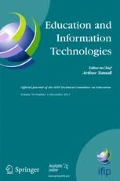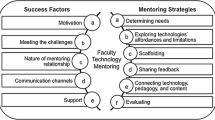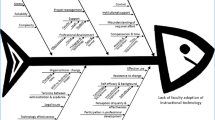Abstract
This paper summarized findings from an empirical study that evaluated the effectiveness of a technology incentive project, MEET, on facilitating the adoption of a web technology CCC Confer among college instructors. Results show that teachers’ technology adoption can be facilitated by providing certain incentives. A number of strategies were essential to the effectiveness of this incentive project: (1) Involving teachers in the decision-making process to make the technology integration project meaningful to them; (2) Helping teachers to develop a well-designed plan with realistic goals and a feasible implementation outline; (3) Building a collegial community from where teachers can learn from peers, obtain support from their social-networks, and work collaboratively; (4) Leading with strong leadership to ensure high morale, sufficient resources and support that are indispensible to the successful implementation of a technology project; and (5) Proving timely support to help teachers remove roadblocks. Restraining factors included insufficient critical appraisal, the absence of collaborative projects, and few face-to-face meetings. Specific implications for technology integration are discussed.
Similar content being viewed by others
References
Becker, H. J., Ravitz, J. L., & Wong, Y. -T. (1999). Teacher and teacher-directed student use of computers. Teaching, Learning & Computing Report 3. Center for Research on Information Technology and Organizations, University of California, Irvine. (November, 1999). Available on-line at http://www.crito.uci.edu/tlc/findings/computeruse/.
Berliner, D. C., & Biddle, B. J. (1995). The Manufactured Crisis: Myths, Fraud, and the attack on America’s public schools. Longman.
Bruce, B. C. (1993). Innovation and social change. in Bruce, B. C., Peyton, J.K., & Batson, T. (ed.) Network-Based Classrooms: Promises and realities, (pp. 9–32). Cambridge University Press.
Bruce, B. C., Peyton, J. K., & Batson, T. (Eds.) (1993). Network-Based Classrooms: Promises and realities. Cambridge University Press.
Burbules, N., & Callister, T., Jr. (2000). Watch IT: The promises and risks of new information technologies for education. Boulder, Colorado: Westview Press.
Collis, B. A., Knezek, G. A., Lai, K., Miyashita, K. T., Pelgrum, W. J., Plomp, T., & Sakamoto, T. (1996). Children and computers in school. Lawrence Erlbaum Associates, Publishers Mahwah, New Jersey.
Corcoran, T. B. (1995). Helping teachers teach well: Transforming professional development (CPRE Policy Brief) [Online]. Available: http://www.ed.gov/pubs/CPRE/t61/.
Cuban, L. (1986). Teachers and machines: The class room use of technology since 1920. New York: Teachers College Press.
Cuban, L. (1999). The Technology Puzzle, Education Week, 4, August, 47, 68. Available online: www.edweek.org/ew/vol-18/43cuban.h18.
Cuban, L. (2001). Oversold and Underused: Computers in the Classroom. Harvard University Press.
Harless, T. (1975). An ounce of analysis is a pound of cure. Newman, GA: Harless Performance Guild.
Harris, J. B., & Grangenett. (1999). Correlates with use of telecomputing tools: K-12 teachers' beliefs and demographics. Journal of Research on Computing in Education, 31(4), 327–340.
Honey, M., & Moeller, B. (1990). Teacher's beliefs and technology integration: different values, different understandings (Technical Report 6). New York: Center for Children and Technology.
Lei, J. (2005). The Dynamics of Technology Use in Schools. Doctoral dissertation, Michigan State University.
Margerum-Leys, J., & Marx, R. W. (2003). Teacher knowledge of educational technology: a case study of student/mentor teacher pairs. In Y. Zhao (Ed.), What should teachers know about technology: Perspectives and practices (pp. 123–160). Greenwich, CT: Information Age Publishing.
Schofield, J. W. (1995). Computers and Classroom Culture. Cambridge University Press.
Schofield, J. W., & Davidson, A. L. (2001). Bringing the internet to school—lessons from an urban district. Jossey-Bass.
Tan, S., Lei, J., Shi, S., & Zhao, Y. (2003). The Adult-Children Tension: Activity Design and Selection in After-school Programs. Paper presented at American Educational Research Association Annual Meeting, Chicago, April 19–23. Tyack & Cuban, 1997.
Tyack, D., & Cuban, L. (1995). Tinkering towards utopia: a century of public school reform. Cambridge, MA: Harvard University.
Urban-Lurain, M., & Zhao, Y. (2004). Freedom to learn evaluation report: 2003 project implementation. Retrieved June 2005, www.hflcsd.org/ftlsummary.pdf.
Zhao, Y., & Frank, K. (2003). Factors affecting technology Uses in schools: an ecological perspective. American Educational Research Journal, 40(4), 807–840.
Zhao, Y., Pugh, K., Sheldon, S., & Byers, J. L. (2002). Conditions for Classroom Technology Innovations. Teachers College Record, 104(3), 482–515. doi:10.1111/1467-9620.00170.
Zhao, Y., Frank, K., & Ellefson, N. (In press). Fostering Meaningful Teaching and learning with technology: Characteristics of Effective professional Development Efforts. In Floden R. & Ashburn, E. (Eds.). Leadership for Meaningful Learning with Technology. Teachers College Press.
Zucker, A., & McGhee, R. (2005). A Study of One-to-One Computer Use in Mathematics and Science Instruction at the Secondary Level in Henrico County Public Schools. http://www.ubiqcomputing.org/FinalReport.pdf.
Author information
Authors and Affiliations
Corresponding author
Rights and permissions
About this article
Cite this article
Lei, J., Morrow, B. Teachers’ adoption of technology innovation into pedagogical practices. Educ Inf Technol 15, 143–153 (2010). https://doi.org/10.1007/s10639-009-9101-4
Published:
Issue Date:
DOI: https://doi.org/10.1007/s10639-009-9101-4




